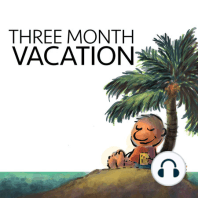4 min listen

Validating Your Idea: How To Beat Analysis-Paralysis
Validating Your Idea: How To Beat Analysis-Paralysis
ratings:
Length:
32 minutes
Released:
May 3, 2017
Format:
Podcast episode
Description
Even if you have the best business idea in the world, analysis-paralysis can stop you in your tracks You feel frozen, not sure what to do. So you research. Then you do some more research and educate yourself even more. But that doesn't get you very far, does it? Even famous people like Leonardo da Vinci and Michelangelo would get stuck in this mode, just like you. But they still went on to create great art. So how do you create great “art” as well? Find out and beat the analysis-paralysis once and for all. ----------- In this episode Sean talks about Part 1: Two ways to validate your business idea Part 2: What makes a viable product? And how do you validate it? Part 3: How to deal with analysis paralysis? Click here to read online: https://www.psychotactics.com/validating-business-idea/ ----------- How do you go about validating your business idea to give yourself the best chance of success? Can you think of a TV series that's generated over US$ 3.1 billion so far? If you answered, Seinfeld, you're perfectly right. Except for one little fact. Seinfeld almost didn't get off the ground. As author Adam Grant mentions in his book, “Originals”, two entertainers got together to create a 90-minute special. Despite their abilities, they couldn't find enough material to fill the 90-minute special, and so they decided to create a half-hour weekly TV show. And that's precisely where all the trouble began. The TV Network folks looked at the script and thought it was terrible Undeterred, they went on to create the pilot for the series. A hundred viewers dissected the strengths and weaknesses of the show. The majority of the test audience decided they wouldn't watch such a show. But a test audience in one city may hate the show and others may love it, which is why the pilot got screened at four diverse cities. Six hundred people in all saw the show, and the results were dismal. They all thought it wasn't something they'd ever watch again. And at that point, Seinfeld should have simply died. And it might have if it wasn't for one network executive who doggedly campaigned for them to make and air four more episodes. The drama didn't stop there, and Seinfeld lurched back and forth, always threatening to tip itself into oblivion. Johannes Sebastian Bach is considered to be one of classical's virtuosos He wrote over a thousand pieces of music in his lifetime. Not far behind was Beethoven and Bach who composed 650 and 600 pieces respectively. And yet, despite their voluminous body of work, they were as unsure as you and me about what would work and what wouldn't. Beethoven, for instance, trashed the final movement of his most celebrated work in the Fifth Symphony. Only later did he decide to put it back. Could he not tell right from the start that it was an amazing part of the musical piece? Throughout history, experts have failed to spot the superstars. J.K. Rowling, the Beatles, Elvis Presley. History has hundreds of examples of bad calls, and it's not as though the crowd does better. Despite what you hear about the wisdom of crowds, the crowds are pretty hopeless at it as well. Which is why Seinfeld's early episodes got panned so badly. 1) If everyone is guessing, how would you ever be able to validate an idea? There are two ways to validate an idea, and they're both reasonably bizarre. —The first way is not to do any testing with audiences at all. Instead, there's another group that can help you with greater accuracy. —The second way is to create whatever you jolly well please, but then link it to an existing problem. Let's start with the first point and figure out which group tends to be more accurate than others When we sit down to create a product or service, we instantly realise that we're not alone. If you're in marketing, there are thousands, if not tens of thousands of books on marketing. If you're in health, fitness, nutrition, programming, illustrations—it doesn't matter what you pick—it's all been covered. It's at this point we feel
Released:
May 3, 2017
Format:
Podcast episode
Titles in the series (100)
Book Recommendation: The Talent Code: Why did we have so many great artists, painters and sculptors in the Renaissance? Why does Brazil produce so many great soccer players? Is slow learning better than fast? Learn more by reading "The Talent Code" by Daniel Coyle. / / For more:... by The Three Month Vacation Podcast